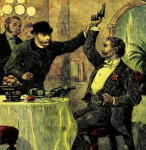Is a Boycott an Act of Violence?

 People tend to think of boycotts as classic non-violent direct action. Power to the people! and so on. Often, in recent years, boycotts have been used by consumers to pressure companies on a range of progressive issues, such as gun control and marriage equality.
People tend to think of boycotts as classic non-violent direct action. Power to the people! and so on. Often, in recent years, boycotts have been used by consumers to pressure companies on a range of progressive issues, such as gun control and marriage equality.
But of course, boycotts have not always been a progressive thing — they’re used by activists on all parts of the political spectrum. And historically, they’ve sometimes been used for some rather nasty purposes. In the 1920s, for example, the Ku Klux Klan quite openly used boycotts to drive Black-owned stores (along with stores owned by Jews and Catholics) out of business. This was a strategy aimed ultimately at driving out entire minority populations out of particular towns and states.
Kathleen Blee, in her book Women of the Klan: Racism and Gender in the 1920s, notes with apparent surprise that among the informants (former Klan members) she interviewed, “None saw [such use of economic power] as an act of violence.” Linda Gordon, in her own book, The Second Coming of the KKK: The Ku Klux Klan of the 1920s and the American Political Tradition, cites Blee on this point. Both authors, seem to find this remarkable, implying that they (these authors) do see Klan boycotts as a form of violence. I’m tempted to agree with them.
But wait, shouldn’t we distinguish boycotts from the genuinely violent behaviours engaged in by the KKK? Isn’t “violence” here just a metaphor?
Maybe. But it’s worth noting that economic harms are genuine harms. Economic losses can mean the inability to eat, or to feed your family. The owner and employees of a Catholic-owned business in a small town in Indiana in the 1920s might have suffered very real hardship if the Klan convinced a sufficient proportion of the town’s population not to shop there, as they sometimes did. I suspect many people would, if pressed, prefer to suffer some measure of literal, physical violence (a black eye? a moderate beating? a few broken windows?) to the kind of economic loss such boycotts implied. Economic harms are meaningful.
Granted, not all cases are so dramatic: when Democrats in the US boycotted In-N-Out Burger in 2018 for donating to the Republican party, it was highly unlikely that In-N-Out was going to be driven out of business. Real economic damage (of a kind we might think of as akin to violence) was highly unlikely.
The goals of the In-N-Out boycott (and others like it) were different, too. No one really wanted to harm In-N-Out — applying economic pressure was a mere tool. The goal was more likely symbolic, or at most aimed at producing enough economic pain to get In-N-Out to reconsider its approach to political donations. But then, boycotts were arguably a ‘mere tool’ for the KKK, too. They arguably had nothing against boycotted businesses, themselves, but used boycotts to exert economic pressure intended to get the proprietor-owners to leave town. Killing the business wasn’t the point. Getting rid of ‘the wrong sorts of people was the point.
Another possible difference: the KKK had shown itself fully willing to engage in physical violence. So there was always the knowledge that if the boycott didn’t work, things could end going in a different direction. Once violence is on the table, so to speak, then every other tactic being used is suffused with violent potential. There was no indication in 2018 that Democrats were going to turn violent to augment the force of their boycott, or that things would get physically violent if In-N-Out didn’t give in. So in that sense, the 2018 boycott was more clearly non-violent than the KKK boycotts of the 1920s.
Still, the question does give pause. Boycotts do occupy part of a spectrum of direct-action activities, understood as extra-legal activities designed to change someone’s behaviour. They are attempts to go beyond rational persuasion to take matters into one’s own hands, to force an outcome that one is unable or unwilling to argue for. Of course, that’s probably sometimes morally required. But it’s not to be taken lightly.


[…] Here’s a link to a piece that raises interesting questions about boycotts and violence. […]
Thanks for putting boycotts into a spectrum. A childhood chant in the 1950s was “Sticks and stones might break my bones but names will never hurt me.” I guess, for some like the KKK, name-calling (i.e. hateful speech) and boycotts are the physically non-violent spectrum-companions of sticks, stones, beatings and lynchings. Let’s call all of them uses of force, and contrast them with argument that seeks the other’s voluntary (unforced) consent. As against your suggestion in your last paragraph, I imagine that boycotts might also be started by those who tried very hard to persuade others with rational and moral arguments but were met with deaf ears, not good counter-arguments.
Yes, surely for some folks a boycott is something you *resort* to, rather than a starting point. The same goes for use of physical violence, I suppose.
I’m not sure how “many” people would “prefer” physical harm to “economic harm”! This seems a stretch. For example, I can recover much easier from “economic harm” than the trauma and long-term effects of physical harm. The politicians who are pushing whole populations out of a pandemic lockdown are clearly taking “economic harm” as greater than even the deaths of large segments of the population as collateral damage necessary to keep the economy going at full speed!
I think it depends on the scale of both harms. I’ve read that loss of a job is psychologically one of the worst thing that people experience. If you lose a job, and (let’s suppose) suddenly can’t pay the mortgage or feed your family…that’s pretty bad. I bet — just a hypothesis! — that many people would accept substantial (maybe not permanent) harm as “better.”
You seem eager to forget that the KKK didn’t stop at simple boycotts. They also were physically violent to these merchants and vandalized the businesses in question. That is where the violent element stems from.
Not eager to forget that, no. (I did specifically say, “the KKK had shown itself fully willing to engage in physical violence”.) They did (in the era I’m talking about) sometimes get violent and that possibility surely added force to their boycotts. But very often the pressure was merely social pressure (but, I suggest, not much less evil for that!)
This is a insightful piece. Thank you for providing your point of view.
This is insightful. When it comes to economic damage, I would distinguish it between the kind of damage a corporation is doing when it comes to workers’ rights versus boycotting a company that publishes a book, movie, or music that someone finds offensive. I would support the right of a group to do the latter but wouldn’t support the action itself. This is an issue for members of my union as they seek to protect the public sector jobs against our provincial government. Many have sought to boycott companies that have done business with the government as a way of opposing a wrong. This was successful in 2013-2014 when a private for profit company locked out the workers. Many members of my union decided to boycott the person who ran that home care centre by boycotting the businesses he owned. It was successful because he eventually had to come to the table and bargain with these employees.
This was a very interesting read. I like that you brought up the differences between causing economic harm and physical harm that boycotts can cause. Many people associate boycotts with acts of violence but that isn’t always the case. Just like you said, economic harm in some cases depending on how you look at it can cause just as much damage or possibly more than physical harm. The long-term effects of losing a job or losing a business can sometimes be more devastating because of having to struggle to pay bills and feed your family, as you’ve touched on. In this way, causing economic harm in a boycott can be more effective in causing social change than physical harm can.